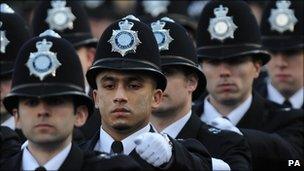Police pay and conditions review launched by Home Office
- Published

Police numbers are expected to fall as a result of public spending cuts
Home Secretary Theresa May has said nothing will be "off limits" in a review of police pay and conditions.
Announcing the details of the expected review for England and Wales, Mrs May said she wanted to see "modern management practices".
The review will be led by Tom Winsor, the former rail regulator, who will report back by June 2011.
Chief constables are currently locked in crunch talks with the Home Office over budget cuts.
The current three-year police pay deal is coming to an end and has been worth an average rise of 2.6% a year to rank-and-file officers.
The coalition agreement struck between the Conservatives and the Liberal Democrats committed to launching a full review of police pay and conditions in England and Wales. Policing conditions in Scotland and Northern Ireland are both devolved matters.
The Home Office said that Mr Winsor's review, external would be the most comprehensive in 30 years and would cover "the role and nature" of the office of constable and examine the rules around the legal ban on police officers striking.
Mr Winsor would be supported by "professional advice" from Sir Edward Crew, the former West Midlands chief constable, and Professor Richard Disney. The academic is a labour market economist and long-standing adviser to government on public sector pay.
Ministers have asked Mr Winsor to report back in two stages. He will produce his first report by February 2011 into "short-term improvements" to the police service. The second part of his review covering longer-term reforms of pay and conditions is expected four months after that.
Mrs May said: "It is vital we have a modern and flexible police service to meet the ever-changing demands placed upon it.
"By bringing modern management practices to the police, this review will help ensure chief constables can deliver the front-line services people want, while providing the value for money that is so vital in the tough economic times we face.
"We need radical solutions to improve policing - nothing will be off-limits in this review."
The Home Secretary said the review must focus on how pay and conditions relate to maximising the number of officers available on the front line - but also ensure that forces modernised to take into account of changes elsewhere in the public sector and the wider economy.
However she added that the review's conclusions must take into account the "tough economic conditions" of the day.
Mr Winsor said: "Every day those on the front line can face difficult and dangerous situations. Throughout this review, I shall be guided by the overriding principle of fairness - fairness to individual police officers and staff, and fairness to the taxpayer."
Paul McKeever, chairman of Police Federation which represents rank-and-file officers in England and Wales, said: "The terms of reference for the review... appear to take cognisance of the unique status of police officers and the restrictions on our private and working lives.
"We appreciate the fiscal situation the country faces but trust the review will take account of the difficult challenges police officers face and the extreme dangers inherent in the job."
Sir Hugh Orde, president of the Association of Chief Police Officers said that he "strongly supported" the review.
"Chief officers are absolutely committed to doing all they can to ensure that front line policing services are protected," he said. "We believe that the development of a modern pay and reward framework is essential and timely.
"What is required is a scheme that treats officers fairly and recognises their hard work, while providing chief officers with the critical flexibility to respond to the current financial challenges."
- Published14 September 2010
- Published15 September 2010